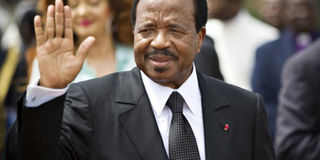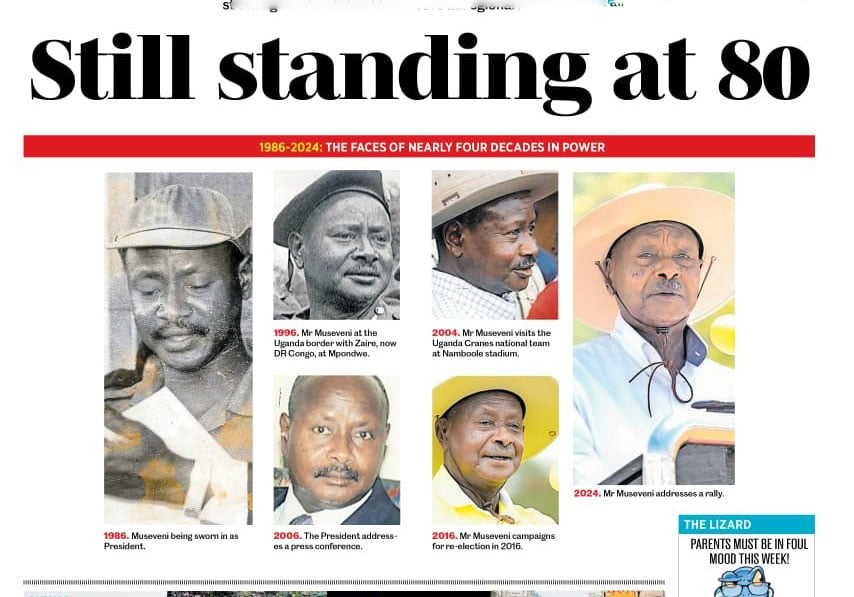Prime
Biya still clings on after 33 years in power

What you need to know:
Complaint. Doctoring of the electoral system, some Cameroonians claim, has contributed to Mr Biya’s stay in power for the past 33 years
Yaounde.
Paul Biya, who has led Cameroon since 1982, has left open the possibility of running for another mandate when his current tenure ends in three years.
Responding to a question at the Unity Palace on July 3 about his longevity in power and the likelihood of him running for the 2018 presidential election, President Biya said the election year was not among his current preoccupations.
He said he was still serving a seven-year tenure which Cameroonians chose to give him and not the twenty-three other candidates who were also in the running in 2011.
“It is certain that elections will be held in 2018, but 2018 is still far away. So, come 2018 I’ll decide whether to seek another mandate or take my retirement,” Biya said at the press conference.
The 82-year-old leader’s response has only deeply the entrenched the thinking among Cameroonians that Biya is eying another mandate.
Prof Tazoacha Asonganyi, a Cameroonian political analyst, says the country’s democracy is a charade.
In reality, Asonganyi argues that Cameroon’s is a make-believe multiparty system where power is solely wielded by the ruling Cameroon People’s Democratic Movement. (CPDM).
“The ballot has since failed to oust Biya from power. That is why he has been able to boast that even in 2018 and beyond, he can stand for an election and win as often as he wants. The ballot box represents virtually nothing in Cameroon,” Prof Asonganyi adds.
The leader’s succession is a taboo topic within government circles and his ruling CPDM.
Cameroon has a one-round presidential election system where a candidate only has to garner the most number of votes to be declared winner. No percentage threshold exists.
In most African countries that practice the one-round electoral system, incumbents have always emerged victorious.
Such doctoring of the electoral system, some Cameroonians claim, has contributed to Mr Biya’s stay at the helm of the state for the past 33 years.
Before the presidential elections of October 1992, after the return to multiparty politics, parliament debated the two-round electoral system in an extraordinary session in September of that same year. The two-round system was eventually not adopted.
Biya wouldn’t have been eligible for the 2011 presidential elections if parliament had not tinkered with the 1996 constitution and annulled presidential term limits in 2008, a move critics say was remote-controlled by the leader.
Supporters of Mr Biya’s CPDM, in a publication, “begged” the president to run again after parliament scrapped the term limits.
Mr Biya claimed that by running for the 2011 presidential elections, he was responding to the “the people’s call”. His party chose him as its presidential candidate at a congress a month before the 2011 polls.
Though Biya has always been elected, critics say he is an illegitimate president.
Their arguments are legion and one of them is that a president elected by less than five million people in a country with a population of over 20 million inhabitants is not legitimate.
Willibroad Dze-Ngwa, a Cameroonian political researcher, agrees that Biya has tactfully made sure power stays in his hands.
“The minister of Territorial Administration and ELECAM (elections governing body) officials are all appointed from the central committee of the CPDM,” he says.
“He who pays the piper dictates the tune. He dictates the tune in Cameroon because all of those appointed officials have been appointed by him. He can dismiss them. The constitution gives him excessive powers. So it is a matter of volition. If Biya wants he will remain president,” he adds.
The opposition has been clamouring for a level political playing field. But each time the opposition has requested the establishment of such institutions to give credibility to the electoral process, Biya has given custom-made hybrids of the opposition’s requests.
Before 1992, elections in Cameroon were managed by the ministry of Territorial Administration. The ministry was also solely responsible to rule on the eligibility of potential candidates for electoral positions.
The opposition fought against the management of elections by the Ministry of Territorial Administration and demanded the creation of an independent electoral commission.
In response, Biya created the National Elections Observatory (NEO) after a street protest by MPs of the leading opposition party, the Social Democratic Front (SDF).
Instead of the independent electoral commission, the president opted for the creation of a National Elections Observatory (NEO).
The opposition persistently advocated that the observatory was not sufficient guarantee for free and fair elections to be held in Cameroon. NEO was dissolved and another organ, Elections Cameroon (ELECAM) created. Yet its independence is still questionable. Its members are appointed by Biya and its current chair, Dr Samuel Fonkam Azu’u, had been a firebrand activist of Biya’s party. He said he resigned from the party when he was appointed to head the elections management body.
who is biya?
• When Mr Paul Biya first became president in 1982, it was within the context of a single-party system. He accepted the introduction of multi-party politics in the early 1990s and went on to win the 1992 presidential election.
• He won the 1997 presidential election, which was boycotted by the main opposition parties.
• At the next election, in 2004, which he won, opposition parties alleged widespread fraud.
• Cameroon’s parliament in April 2008 passed a controversial amendment to the constitution enabling Biya to run for a third term of office in 2011.
• He won a new seven-year term in the October 2011 election, in a vote that international observers and the opposition said was marred by irregularities.



